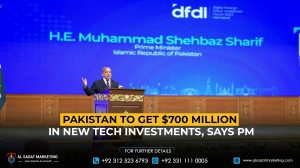At a crucial meeting of the Economic Advisory Council on Wednesday, which Prime Minister Muhammad Shehbaz Sharif chaired, council members gave their full support to the government’s economic policies and made important recommendations meant to bolster Pakistan’s economic expansion.
Also Read: Smart Parents Invest in Real Estate: Buy Plot for Children’s Future
The premier also disclosed that discussions over the regulation of virtual currencies were still in progress.
PM Shehbaz praised the recommendations and directed the appropriate authorities to work with the council members to develop a thorough action plan based on them.
He underlined that the team’s combined efforts, rather than any one person’s, were what led to economic stability.
“The current potential for regional trade would be fully utilized,” he said, reaffirming his commitment to work for the economy’s sustainable development.
The prime minister also emphasized initiatives to enable local industries to compete in global markets through exports.
“Among the government’s top priorities are industry, agriculture, IT development, job creation, and increasing exports,” he stated, adding that the prime minister was concentrating on setting up green data centers across the nation.
In order to increase the number of independent contractors and IT exports, he said, efforts were also being made to enhance telecommunications services and bring internet connectivity to outlying places.
He also emphasized the importance of converting the fruitful conversations at the meeting into workable plans.
The meeting’s participants agreed that Pakistan’s economy was stable and growing, citing price stability as the reason for higher production.
They claimed that the government’s economic team had disproved all forecasts and assessments and that, for the first time, investors, businesspeople, and international economic organizations agreed with the government’s action plan.
The prime minister’s sincere commitment to enacting institutional reforms, which had never been witnessed in Pakistan’s history, was also praised by the delegates.
The participants believed that all of the key sectors had grown as a result of the country’s improved tax structure, simpler laws, and the development of an atmosphere that was welcoming to investors and businesses.
They pointed out that the government’s economic team was easily accessible to the business community for the first time in history and that frequent consultations were taking place. According to them, the decline in smuggling has also helped boost exports, which is a good thing.
Along with Federal Ministers Ahsan Iqbal, Rana Tanveer Hussain, Jam Kamal Khan, Ahad Khan Cheema, Mohammad Aurangzeb, Minister of State Ali Pervez Malik, Prime Minister’s Coordinator Rana Ehsan Afzal, and other high-ranking officials, Jehangir Khan Tareen, Saqib Shirazi, Shehzad Saleem, Musaddiq Zulkarnain, Dr. Ejaz Nabi, Asif Peer, Zaid Bashir, and Salman Ahmed were present at the meeting.










